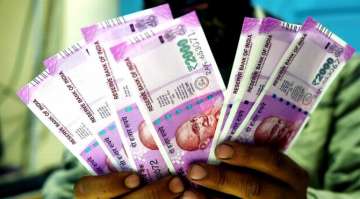Of Rs 11,000 cr political parties received in 11 years, 69 pc came from unknown sources: ADR
As much as 69 per cent of the total income of six national parties and 48 regional parties in the last 11 years came from unknown sources, according to data collected by the Association for Democratic Reforms (ADR).

As much as 69 per cent of the total income of six national parties and 48 regional parties in the last 11 years came from unknown sources, according to data collected by the Association for Democratic Reforms (ADR).
The Income Tax returns filed by political parties show that of the Rs 11,367.34 crore income shown by them between 2004-05 and 2014-15, Rs 7,832.98 crore were accumulated from unknown sources.
The six national parties included in the study were Congress, Bhartiya Janata Party (BJP), Bahujan Samaj Party (BSP), Nationalist Congress Party (NCP), Communist Party of India (CPI) and Communist Party of India- Marxist (CPM).
The All India Trinamool Congress (AITC), which was declared a National Party only in September, 2016, was also included in the study.
Political Parties are not required to reveal the name of individuals or organizations giving less than Rs. 20,000. As these donors can not be identified, these donatiosn are termed as coming from ‘unknown sources’.
According to the data collected from I-T returns by the ADR, 83 per cent of the total income of the Congress, Rs 3,323.39 cr came from unknown sources while the BJP collected Rs 2,125.91 cr, 65 per cent of total income, from unknown sources.
BSP is the only party to consistently declare receiving none of its donations above Rs 20,000 between 2004-05 and 2014-15. The party said that all of its donations came from unknown sources.
The total income of the BSP increased by 2057 per cent from Rs 5.19 crore during 2004-05 to Rs 111.96 crore during 2014-15.
On the other hand, 94 per cent of Samajwadi Party’s income of Rs 766.27 crore came from unknown sources. Shiromani Akali Dal (SAD) said that 86 per cent of its total income, Rs 88.06 crore, came from unknown sources.
While the income of national parties from unknown sources increased by 313 per cent, from Rs 274.13 cr during FY 2004-05 to Rs 1130.92 cr during FY 2014-15, regional parties recorded a rise of 652 per cent in incomes from unknown sources, from Rs 37.393 cr during FY 2004-05 to Rs 281.01 cr during FY 2014-15.
All the data were obtained by the ADR by filing RTI applications with the Income Tax department.
ADR noted in its report that 45 of the 51 regional political parties considered for this report have not submitted their donations statements to the Election Commission for at least one financial year.
The 12 regional parties which have never filed their contributions report since FY 2004-05 are: J&K PDP, AJSU, NPP, RSP, MPC, KC-M, SKM, AINRC, PDA, MSCP, HSPDP and PPA.
The contribution statements, submitted by the political parties declaring names and other details of donors who contribute above Rs 20,000, are the only known sources of income of political parties.
The unknown sources are income declared in the IT returns but without giving source of income for donations below Rs. 20,000. Such unknown sources include ‘sale of coupons’, ‘Aajiwan Sahayog Nidhi’, ‘relief fund’, ‘miscellaneous income’, ‘voluntary contributions’, ‘contribution from meetings/ morchas’ etc. The details of donors of such voluntary contributions are not available in the public domain.
Other known sources of income include sale of moveable & immoveable assets, old newspapers, membership fees, delegate fee, bank interest, sale of publications and levy whose details would be available in the books of accounts maintained by political parties.
ADR has recommended that full details of all donors should be made available for public scrutiny under the RTI.
“Any organization that receives foreign funding should not be allowed to support or campaign for any candidate or political party,” ADR said.
“Scrutiny of financial documents submitted by the political parties should be conducted annually by a body approved by CAG and ECI so as to enhance transparency and accountability of political parties with respect to their funding,” it said.
“The National and other political parties must provide all information under the Right to Information Act. This will only strengthen political parties, elections and democracy,” the NGO said.